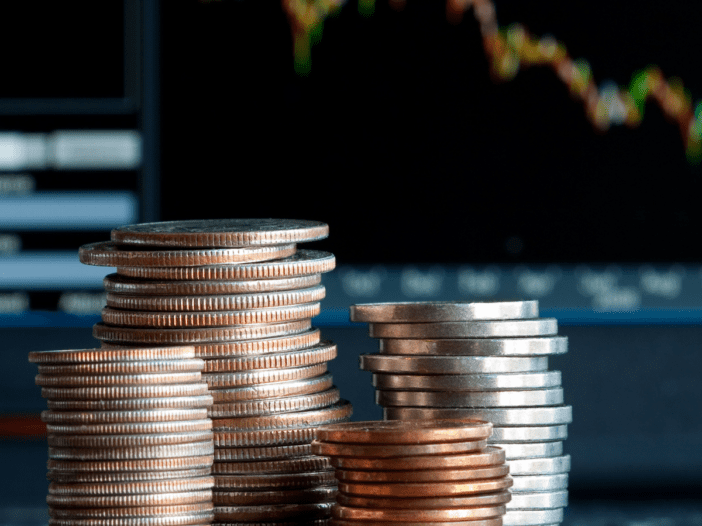‘Nowhere else does an economy work like this.’
A friend in Buenos Aires
Argentines have been living with inflation for a long time. It was 2,000% in 1990. It’s 50% now. If they don’t know how to survive it, no one does.
Can we learn from them? We might have to. Here’s Business Insider:
‘US stocks fell on Monday, with the Dow Jones Industrial Average down 800 points and the Nasdaq ending lower by over 3% as investors weighed the impact of surging oil prices and eyed possible new sanctions on Russia’s energy sector.
‘The geopolitical turmoil has sent commodities reeling, as wheat, nickel, gold, and oil all soared during Monday trading.’
A nearby news item shows regular gasoline at US$6.95 a gallon. And the price of oil itself rose to US$139 a barrel. Both experience and ‘the experts’ say a recession is stalking us.
Meanwhile, Congress is working on a bill to exclude Russian oil from the US market. Thus, the US is attacking the three key elements of modern prosperity all at once — energy, money, and trust. It cuts off supplies of oil, it undermines the dollar with sanctions on honest savers and investors, and inflation and sanctions erode trust in the whole US-dominated financial system.
Where this leads is anybody’s guess. But somewhere, faintly in the distance, we hear a tango beat.
El Fin del Mundo
Our man in Buenos Aires continued:
‘You look around, you see people living fairly normally. You see people with new cars — although there aren’t many of them. You see houses being built. You see people out and about, having a nice dinner or shopping.
‘If you had 50% inflation in the US, it would be another story. It would be a hellacious disaster. You’d have a revolution. (Our contact used to live in Miami.) People depend on credit. They have mortgages to refinance. They have debts to pay. The system depends on credit. Everything is sold on credit. If interest rates go up, the whole economy collapses.
‘That doesn’t happen here, basically because the economy already collapsed long ago. People don’t have mortgages. They don’t have debt. Nobody cares about interest rates because they can’t borrow money anyway.
‘As soon as people get money, they spend it.’
Seems simple enough. When you have money, don’t try to save it. But what do you spend it on?
Our friend went on:
‘Real estate. Prices are low here. People buy now…and then they wait for them to go up again. That’s another part of the formula. Here, we go in Biblical cycles. Seven good years. Then, seven bad years. Sometimes we are the cheapest country in the world; then we’re the most expensive. Right now, we’re in bad years. So people take their money and add on to their houses…or buy an apartment. The rents are low too, so yields are poor. But prices will probably go up in the 7 good years.
‘And by the way, there’s a political cycle too. The Peronists (nationalist, socialist, populist) are in power now. But they’ve made such a mess of things, voters will probably turn away from them in the next election, in November. Then, we’ll see some good times, before the bad times come back.’
Buenos Aires is a treat. Lively. Sophisticated. Cheap. The food is good. The weather this time of year is delightful. The cafes and restaurants are busy. People seem to live well.
But there’s more to the story. Here, the economy only works because people have learned to cheat.
Money caves
Our friend continued:
‘The nice thing about living here is that the government does the dumbest things. But they are intentionally incompetent. The rules and regulations are never well enforced. There are always ways around them. Take a look over there…’
He motioned to a place across the street:
‘There’s a “Cueva” [a black-market money exchange…literally, a “cave”]. It’s illegal. But the government knows it is there…and they’ve put a policeman out front so you know it’s safe to go in there.
‘We’re supposed to be having an economic crisis here. But I have a hard time hiring good workers because they can earn more by working remotely for a European or American company. Then, they get most of their pay transferred in cryptos… which is converted to pesos by these cuevas. No trace. No taxes.’
Were it not for the black market, Argentina would be an even bigger mess than it is now. The cuevas are tolerated because they attract foreign currencies…and the country needs foreign currencies to pay its foreign debts. The result is that there are people with money to spend.
Of course, in the poor neighbourhoods it’s another story. There, people are trapped. They have no bank accounts in Miami. Nor do they receive cryptos via the internet. Their incomes, sometimes pitifully small, come from normal jobs and are paid in pesos. Government handouts too are in pesos — and lose value rapidly.
Our friend concluded:
‘It really creates two separate economies. One of them is miserable and desperate. The other enjoys a very high standard of living.
‘But I don’t think the US is ready for this kind of thing…Americans still trust the government. They don’t know how to duck and dodge. And the government would never tolerate a black market like this.’
Regards,
 |
Bill Bonner,
For The Daily Reckoning Australia

